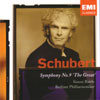Schubert Symphony No 9
Rattle takes the broad view, reviving memories of the Berlin Phil’s glory days
View record and artist detailsRecord and Artist Details
Composer or Director: Franz Schubert
Genre:
Orchestral
Label: EMI Classics
Magazine Review Date: 3/2006
Media Format: CD or Download
Media Runtime: 58
Mastering:
Stereo
DDD
Catalogue Number: 339382-2

Tracks:
| Composition | Artist Credit |
|---|---|
| Symphony No. 9, 'Great' |
Franz Schubert, Composer
Berlin Philharmonic Orchestra Franz Schubert, Composer Simon Rattle, Conductor |
Author: Edward Greenfield
Knowing Sir Simon Rattle has regularly conducted period instrument orchestras, it may come as a surprise that with his Berlin Philharmonic he takes a relatively free and romantic view of this massive symphony, maybe reflecting that this is a live recording. Not only are his speeds on the broad side – broader than those in my comparisons – he allows marked rallentandi at the ends of sections, as at the end of the development sections of both the first and last movements.
His moulding of phrases, too, seems to reflect the older traditions of this great orchestra rather than those of Karajan, who in his 1978 recording is more severe, keeping speeds very steady. One key passage comes in the middle of the Andante con moto slow movement, where on repeated phrases in crescendo Schubert builds up the movement’s biggest climax, resolved after a sudden pause on an affectionate cello melody. Where Karajan, to a surprising degree, maintains a steady speed throughout, even on the warm cello melody, Rattle lingers lovingly, more than I can remember in any recent recording.
What emerges from this relatively relaxed approach is an extra sense of joy in Schubert’s inspiration, with rhythms lifted infectiously. Sir John Eliot Gardiner, too, live at the Salzburg Festival in 1997, has wonderful spring in the rhythms, but his more urgent approach makes the result less relaxed, less joyful.
Not that Rattle’s interpretation lacks bite or precision – quite the opposite: one of its great qualities is the way he brings out the many counter-motifs, notably on cellos or second violins, that in many performances are hidden. That transparency of texture is outstanding: Rattle persuades the orchestra to produce extreme pianissimi, as at the start of the recapitulation in the first movement, where far more than usually one is aware of the score markings.
With full, warm sound, this is a first-rate recommendation. The only slight reservation is that it comes without a coupling, though at 58 minutes for the symphony (even with one of the repeats in the Scherzo and that of the exposition in the finale omitted), one cannot really complain of short measure. Gardiner has the most unusual and attractive coupling in the Goethe setting for male voices, Gesang der Geister über den Wassern.
His moulding of phrases, too, seems to reflect the older traditions of this great orchestra rather than those of Karajan, who in his 1978 recording is more severe, keeping speeds very steady. One key passage comes in the middle of the Andante con moto slow movement, where on repeated phrases in crescendo Schubert builds up the movement’s biggest climax, resolved after a sudden pause on an affectionate cello melody. Where Karajan, to a surprising degree, maintains a steady speed throughout, even on the warm cello melody, Rattle lingers lovingly, more than I can remember in any recent recording.
What emerges from this relatively relaxed approach is an extra sense of joy in Schubert’s inspiration, with rhythms lifted infectiously. Sir John Eliot Gardiner, too, live at the Salzburg Festival in 1997, has wonderful spring in the rhythms, but his more urgent approach makes the result less relaxed, less joyful.
Not that Rattle’s interpretation lacks bite or precision – quite the opposite: one of its great qualities is the way he brings out the many counter-motifs, notably on cellos or second violins, that in many performances are hidden. That transparency of texture is outstanding: Rattle persuades the orchestra to produce extreme pianissimi, as at the start of the recapitulation in the first movement, where far more than usually one is aware of the score markings.
With full, warm sound, this is a first-rate recommendation. The only slight reservation is that it comes without a coupling, though at 58 minutes for the symphony (even with one of the repeats in the Scherzo and that of the exposition in the finale omitted), one cannot really complain of short measure. Gardiner has the most unusual and attractive coupling in the Goethe setting for male voices, Gesang der Geister über den Wassern.
Discover the world's largest classical music catalogue with Presto Music.

Gramophone Digital Club
- Digital Edition
- Digital Archive
- Reviews Database
- Full website access
From £8.75 / month
Subscribe
Gramophone Full Club
- Print Edition
- Digital Edition
- Digital Archive
- Reviews Database
- Full website access
From £11.00 / month
Subscribe
If you are a library, university or other organisation that would be interested in an institutional subscription to Gramophone please click here for further information.




